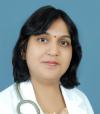Brief Answer:
Explained in details.
Detailed Answer:
Hello XXXXXXX and welcome back,
Let me explain the things in a bit details.
Downs syndrome and some other syndromes like edwards, pataus etc are caused by genetic defects.
The human body is made up of cells and each cell contains structures called chromosomes that determine how we are and regulate all the processes in our body. The number of chromosomes is fixed which is 46 XX in females and 46 XY in males.
Sometimes during the formation of the reproductive cells like the sperm and ovum, defects in the number or structure of these chromosomes occur. Sometimes these defects are repaired while sometimes they are not. With advancing age, there is less chance that the defects will be repaired. Any defect in the chromosome gives rise to defect in the cells that will be produced having those abnormal chromosomes. So if a baby is having defective cells it may have a defective body or mental defects or organ defects and so on.
Down's syndrome is a condition where the baby inherits an abnormal number of chromosomes from the mother. It has 3 chromosomes of number 21. This leads to defects in mental growth, certain physical features like mongol look, mongol eyes etc. So this results form defect in the ovum. Unfortunately we cannot control the ovum or sperm. Also as most of the cells in the body are defective, it is not possible to treat them as of now. We cannot change our genes.
So as of now we are not advanced enough to treat genetic defects easily. Things are still at the research level.
There is no threat to the mother due to Downs. The baby may get aborted if chromosomal or genetic defects are severe.
However we can detect the defects by a process called
amniocentesis, or chorionic villi
biopsy where fluid is collected from the
uterus and the baby's cells are analysed for chromosomal defects.
Ultrasonography at 18-20 weeks also picks up defects in structure like abnormal hands or legs or body etc. If they are there, option for an
abortion is there. Certain blood tests like triple marker also help to predict the risk but are not very accurate.
So the option of treatment for genetic defects is not there as of now. The only thing is we can detect them during
pregnancy and go for an abortion if the baby is defective.
The risk is not 100% other wise I would have advised you not to conceive. However it is slightly more than a women getting pregnant at say 22-23 years.
Other conditions like
diabetes, raised blood pressure also occur in younger women but the risk of developing those complications is again higher with more age. So as I have already said, every pregnancy carries with it some risk of complications. It is slightly more as age increases and extra caution is needed.
Hope this has answered your query.
Feel free to ask any more and I will be happy to answer.
Dr Madhuri







